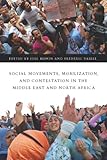Social movements, mobilization, and contestation in the Middle East and North Africa /
Title By: Beinin, Joel [Edited by] | Vairel, Frédéric [Edited by]
Material type: BookSeries: Publisher: Stanford, California : Stanford University Press, c2011.Description: xiv, 308 p. ; 23 cm.ISBN: 9780804775250; 0804775249 (hbk.); 9780804775250 (pbk.); 0804775257 (pbk.)Program: MIST926,MIST906Subject(s): Social movements -- Political aspects -- Middle East -- Case studies | Social movements -- Political aspects -- Africa, North -- Case studies | Political participation -- Middle East -- Case studies | Political participation -- Africa, North -- Case studiesDDC classification: 303.484095609045 Online resources: Location Map
BookSeries: Publisher: Stanford, California : Stanford University Press, c2011.Description: xiv, 308 p. ; 23 cm.ISBN: 9780804775250; 0804775249 (hbk.); 9780804775250 (pbk.); 0804775257 (pbk.)Program: MIST926,MIST906Subject(s): Social movements -- Political aspects -- Middle East -- Case studies | Social movements -- Political aspects -- Africa, North -- Case studies | Political participation -- Middle East -- Case studies | Political participation -- Africa, North -- Case studiesDDC classification: 303.484095609045 Online resources: Location Map | Item type | Home library | Call number | Status | Date due | Barcode | Item holds |
|---|---|---|---|---|---|---|
| REGULAR | University of Wollongong in Dubai Main Collection | 323.0956 SO CI (Browse shelf) | Available | T0046978 | ||
| REGULAR | University of Wollongong in Dubai Main Collection | 323.0956 SO CI (Browse shelf) | Available | T0046979 |
, Shelving location: Main Collection Close shelf browser
Includes bibliographical references (pages 275-303) and index.
Introduction : the Middle East and North Africa beyond classical social movement theory / Joel Beinin and Frédéric Vairel -- Protesting in authoritarian situations : Egypt and Morocco in comparative perspective / Frédéric Vairel -- Leaving Islamic activism behind : ambiguous disengagement in Saudi Arabia / Pascal Menoret -- Egyptian leftist intellectuals' activism from the margins : overcoming the mobilization/demobilization dichotomy / Marie Duboc -- Three decades of human rights activism in the Middle East and North Africa : an ambiguous balance sheet / Joe Stork -- Presence in silence : feminist and democratic implications of the Saturday vigils in Turkey / Zeynep Gülru Göker -- Mobilizations for western Thrace and Cyprus in contemporary Turkey : from the far right to the lexicon of human rights / Jeanne Hersant -- The Egyptian Jamaa al-Islamiyya as a social movement / Roel Meijer -- Hizbullah's women : internal transformation in a social movement and militia / Anne Marie Baylouny -- A workers' social movement on the margin of the global neoliberal order, Egypt 2004-2009 / Joel Beinin -- From Europe to Turkey : a case of the variable value of resources / Emre Öngün -- Unemployed Moroccan university graduates and strategies for "apolitical" mobilization / Montserrat Emperador Badimon.
The Middle East and North Africa have become places that almost everyone "knows" something about. Too frequently written off as culturally defined by Islam, strongly anti-Western, and uniquely susceptible to irrational political radicalism, authoritarianism, and terrorism#151;these regions are rarely considered as sites of social and political mobilization. However, this new volume reveals a rich array of mobilizations that neither lead inexorably toward democratization nor degenerate into violence. These case studies of Morocco, Egypt, Lebanon, Saudi Arabia, and Turkey are inspired by social movement theory, but also critique and expand the horizons of the theory's classical concepts of political opportunity structures, collective action frames, mobilization structures, and repertoires of contention through intensive fieldwork. This strong empirical base allows for a nuanced understanding of contexts, culturally conditioned rationality, the strengths and weaknesses of local networks, and innovation in contentious action in a region where, with the exception of Turkey, there was little sign of broad-based movements for democratization until the Tunisian and Egyptian uprisings of 2010-11.
MIST926,MIST906




